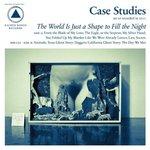
Case Studies The World is Just a Shape to Fill the Night
(Sacred Bones)
Why exactly Jesse Lortz has abandoned the success of his jumpy boy/girl indie folk duo, The Dutchess and the Duke, to record an album of modest, lo-fi acoustic guitar ballads is unclear; it certainly seems like a step down. He’s not only slowed things down, but he’s grown lower-pitched and more intimate, while at times drawing further upon his country influences. He has stories to tell; this is the sound of Lortz getting serious.
So what exactly is missing? Perhaps it’s something in Lortz’ delivery – he sounds fatigued throughout most of the album, even when he’s harmonizing with himself on The Day We Met; he’s oddly detached from the songs, failing to evoke anything except world-weariness. But I’m struggling to find the songs themselves heartfelt, too. Lortz succeeds in creating a dark, menacing atmosphere, but it’s only because he’s laying on his American Gothic themes so thickly, even if it produces the odd excellent line: You’ve sharpened blades on hearts before / But I will not be among them, from California Ghost Story, sticks out.
The main problem is how downright lazy his songwriting is. From the non-sequitur chorus of You Folded Up My Blanket Like We Were Already Lovers to the “I sing these words to the one…” faux-sincerity of Dagger, Lortz makes songwriting seem like a chore rather than an art. Lies in particular offends, beginning: Ask me how many days will I love you / Well how many stars are up in the sky?, and reiterating endlessly – and to be fair, the clichés are subverted in the chorus Don’t ask me cause I’ll only lie – but he stretches the joke out for the entire song when it’s tedious the first time round. He’s all too fond of that lame songwriting gimmick where you reiterate phrases of the same syntax ad infinitum. For instance, Secrets opens: Put the knife back in your pocket / Put the rope back on the wall / Put your pistol in your drawer now / Put the poison on your shelf now, and it’s the stuff of nightmarish open mic nights.
But the song ends with the strikingly poetic phrase that gives the album its title, and I’m wondering how such a profound lyric ended up amidst so much banality. Lortz insists that the Case Studies project will expand beyond music into short stories and poetry, as well as drawing and jewelry making, but I can’t detect any of the ambition that would make this possible on The World is Just a Shape to Fill the Night. There isn’t enough variation on here to retain its limited intrigue, as Lortz relies too much on his consistently unremarkable songwriting; ultimately, it’s a forgettable record.
2 September, 2011 - 05:45 — Stephen Wragg